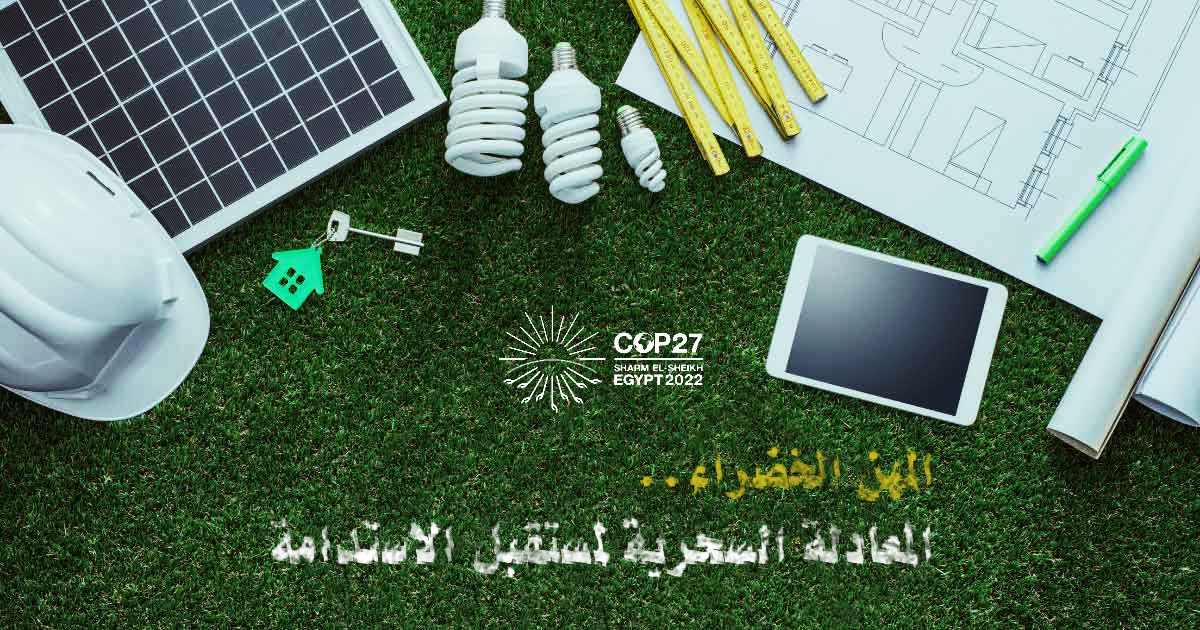One of the participations in the Green Voices Challenge for young men and women in the Arab world
By Ghadeer Taira, Yemen
Today’s societies have no option but to acknowledge and show respect to the planet they live on and that sustains them, Earth. It If human beings seek a safe future, they need to work toward it accordingly. One way this may be possible is by qualifying to work in “green jobs”, which ensure Earth’s sustainability and sustainable development.
Little, however, is known by Arab youths about green jobs: what they are, where they can be trained toward them, and what skills are required to practice them.
One thing that is known is that the concept of “green economy” is about utilizing eco-friendly, zero-emission-producing, no negative impact on the environment natural resources in economic projects.
“Green jobs” that are environmentally, economically, and socially sustainable ensure the protection of the environment, sustainable production, living wages, decent work environments, and respect for labor rights, are accessible to everyone, and their impact is felt even by the most vulnerable.
Green economy helps achieve a balance between human beings and Earth, and, most importantly, helps mitigate the effects of climate change, the biggest challenge of the 20th century, according to Solomon Hsiang, an expert in the economics of climate change .
Green economy requires new jobs and skills that enable human beings to address climate change and limit its impact on the environment. Green jobs are the only way to achieve economic, social, and environmental sustainability.
It is vital that green jobs be made available in agriculture, economic and services sectors, and administration. The majority are in areas such as sustainable energy, green chemistry, green hydrogen manufacturing, green building, forests, green marketing, sustainable transportation and tourism.
A report issued by the ILO predicts that green economy is capable of creating 24 million jobs around the world by 2030 as long as supportive policies are introduced. According to experts, the skills required are based on the knowledge, abilities, and values needed to live in and develop a sustainable, resource-efficient society.
Green jobs require sets of skills that experts divide into four groups:
* Engineering and technical skills required for the fourth industrial revolution, such as computer pogroming, coding, and financial project management.
* Scientific skills and knowledge.
* Monitoring skills.
* Design, creativity, adaptability, flexibility, and even sympathy.
The impact of the COVID-19 pandemic on people’s jobs all over the world cannot be easily forgotten. Some governments invested money in unsustainable sectors in an attempt to recover from job losses. Other, such as China, found better alternatives, choosing to depend on green processes to help the economy recover.
How did China incentivize green technology, to limit natural disasters?
It followed a number of procedures to achieve a balance between economic development and the environment, such as utilizing green energy as a clean, sustainable, and cheap alternative. It replaced unsustainable energy sources with green energy to fulfil the main pillars of sustainable development, including green chemistry, green nanotechnology, green building, and green information technology.
According to the OECD 2020 report, incentive schemes applied in the Middle East and North Africa are good opportunities to invest in real economic shifts and technological innovation without any greenwashing. These opportunities lie in promoting solar and wind energy for smart green cities, desalination projects (supported by green energy), and the development of clean transportation systems. Companies should support green jobs and equip their workers with new through local learning programs. Workers need to start enhancing their employability in the future and upskill regularly. LinkedIn believes that entrepreneurs across countries and sectors are leading green skills and are in increased demand for skilled youth. The chart below presents the top 25 countries with the highest number of sectors with green skills:
We, the youths, are required to upskill in line with the green economy, the fourth industrial revolution, and global trends. We ought to understand that green jobs do not only impact the environment positively, they also give rise to innovation and creativity. Experts expect the contribution of green economy to the global economy to increase to over $12 trillion by 2030.
Modern-day humanity’s greatest responsibility is to protect the environment. Earth has been facing a serious threat since life began on it, which is the loss of balance of nature and its components, which will eventually make the planet uninhabitable. As we have no alternative home yet, we must protect it and nurture it. When human beings reach sufficient awareness about the vital importance nature has for them, we can be reassured that the future is safe. Green jobs are merely an attempt at regulating human activity and attune it to nature.


